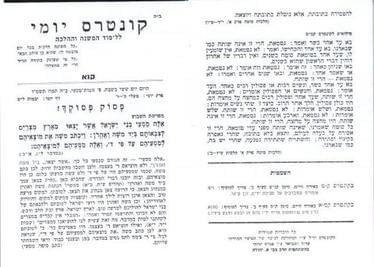
Rabbi Dr. Zvi A. Yehuda
- Thought of the Week
- …
- Thought of the Week
Rabbi Dr. Zvi A. Yehuda
- Thought of the Week
- …
- Thought of the Week
Rabbi Dr. Zvi A. Yehuda
The Rabbinic Mind
Be inspired by Rabbi Dr. Zvi A. Yehuda's timeless teachings.
The launch event for this website
Collaboration on the Mishna

Rabbi Yehuda's collaboration on the Mishna with Pinchas Kehati
Rabbi Yehuda was a prolific teacher who became known in many parts of Israel. He traveled to army bases across the country to teach Torah to soldiers. He was also commissioned to prepare materials for the ביסדי חמד teachers' guide and some מוסד הרב קוק publications. However, his most popular classes were his Mishna classes he broadcast on Kol Israel Radio. Rabbi Yehuda understood that Mishna study was a popular way for Israelis to connect with Torah study while maintaining a working lifestyle. Many also associated the study of Mishna with commemorating those lost in the Holocaust and the War of Independence.
In 1955 Pinchas Kehati began an ambitious project to prepare a modern Hebrew commentary on the Mishna. He was influenced by the Yiddish commentary on the Mishna published by Symcha Petrushka in 1946 and the contemporary publications of Professor Hanoch Albeck. In 1956, Pinchas Kehati hired Rabbi Yehuda to work on the pamphlets together. He credited Rabbi Yehuda on weekly publications of their קונטרסים which featured their novel commentary along with selections of halacha and Torah.
Their collaboration ended in 1960 partway through the effort when Rabbi Yehuda moved to the US. Kehati completed the project in 1964. His sons-in-law published the popular משניות מבוארות books shortly after Kehati died in 1976.
Job: Ordeal Defiance and Healing
Rabbi Yehuda wrote a study guide for teachers and students on the biblical book of Job. He reviewed both traditional and contemporary analyses of the book. Many focused on issues of theodicy: Why does God allow bad things to happen to good people? His guide explores another dimension of the book often overlooked but essential to finding a path through ordeal to a place of healing. Importantly, Rabbi Yehuda focuses on Job's friends. Their long-winded, philosophical messages that occupy most of the book only re-traumatize the victim rather than support his healing. Whereas the theological explanation that allows for suffering may remain a mystery, friends can help friends heal. Job's friends failed, and that's an eternal lesson for humanity. When our friends face tragedy, what can we say that will help them heal? Only one edition of this guide was published in 1990. It was dedicated to Ben Zion "Benny" Yehuda, Rabbi Yehuda's son from his first marriage who tragically died while serving in the IDF.
©2024 Gil Yehuda






